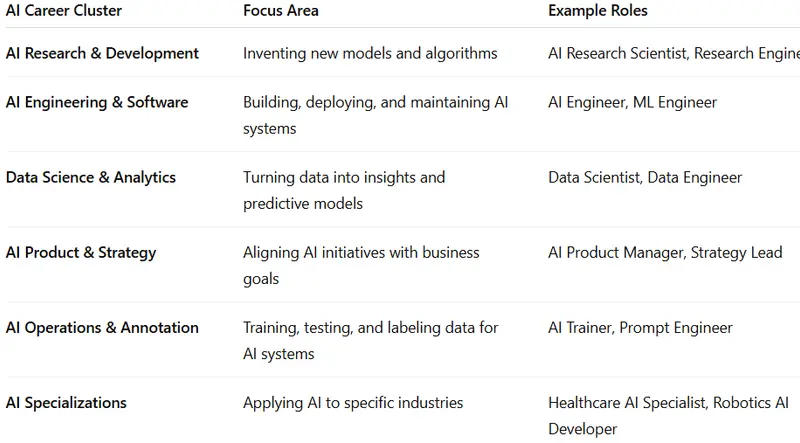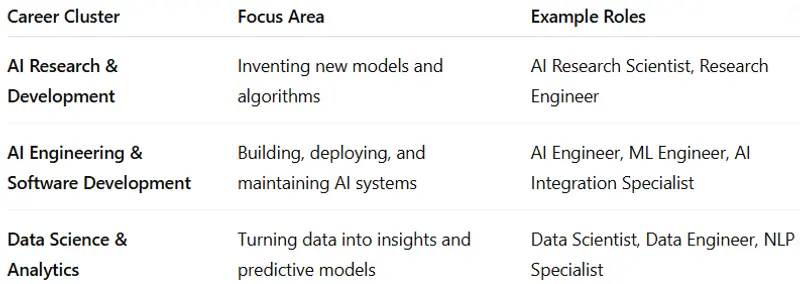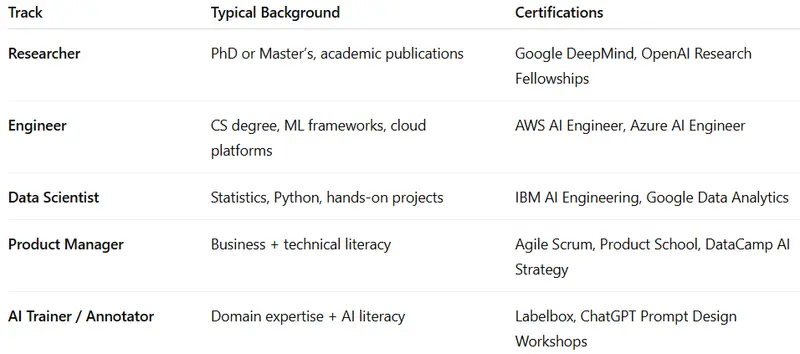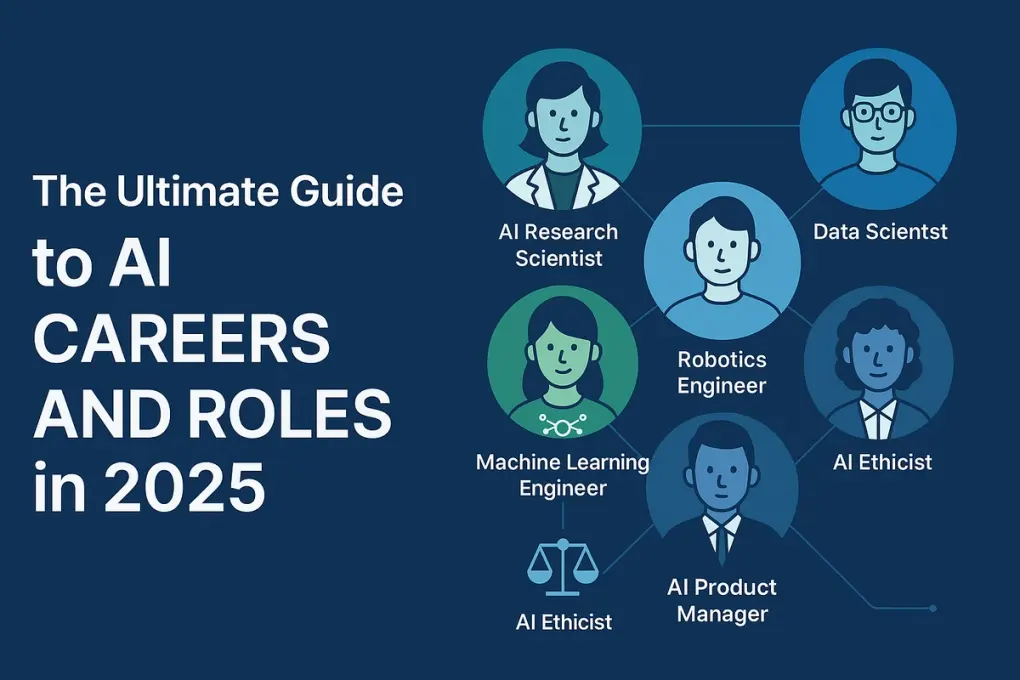🚀 Why AI Careers Are Booming
The rise of artificial intelligence has reshaped nearly every industry and along with it, the job market.
AI is no longer confined to research labs or tech giants, it’s now embedded in marketing, healthcare, finance, robotics, cybersecurity, and beyond.
According to 2025 hiring trends, AI roles have grown over 250% in just two years, spanning both technical and non-technical disciplines.
From AI researchers building new models to AI strategists guiding adoption across enterprises, the field is rapidly diversifying.
💬 The future isn’t about being replaced by AI, it’s about learning how to work alongside it.
🧭 Overview: The New Landscape of AI Jobs
AI careers fall into a few key job families, each requiring a different mix of skills and perspectives:

Let’s dive deeper into each of these career paths, including responsibilities, required skills, tools, salary insights, and career progression.
⚙️ Technical AI Career Paths
These roles form the backbone of AI innovation and deployment. They require strong technical skills in programming, data modelling, and machine learning systems.

🧠 Technical AI careers are ideal for those who enjoy experimentation, coding, and model development. They form the backbone of the AI ecosystem.
🧪 1️⃣ AI Research and Development
Overview:
AI Research and Development (R&D) is the foundation of AI advancement. Professionals here invent new algorithms, architectures, and theoretical frameworks that drive innovation.
Common Roles:
- AI Research Scientist
- AI Algorithm Developer
- AI Ethics and Safety Researcher
- Research Engineer
Responsibilities:
- Design and prototype new ML and deep learning models (e.g. transformer, multimodal, reinforcement learning).
- Run experiments, analyse data, and publish findings.
- Collaborate with engineers to bring research into production.
- Work on AI safety, fairness, and bias mitigation.
Skills & Requirements:
🎓 PhD or Master’s in Computer Science, Mathematics, or related fields.
🧠 Strong in deep learning, statistics, and mathematical modelling.
💻 Expertise in TensorFlow, PyTorch, or JAX.
☁️ Knowledge of AWS, Azure, or GCP for large-scale experiments.
Tools & Technologies:
TensorFlow | PyTorch | Hugging Face Transformers | Git | MLflow | GPU/TPU clusters
Industry Applications:
Healthcare (medical imaging), Robotics (navigation), Finance (trading algorithms), Automotive (autonomous driving).
Salary Range (US):
- Entry: $70K–$120K
- Mid: $120K–$180K
- Senior: $180K–$300K+
💡 Career path: Research Assistant → Scientist → Principal Investigator → Lab Director
🧱 2️⃣ AI Engineering and Software Development
Overview:
These roles focus on transforming AI models into production-ready systems by building the pipelines, APIs, and infrastructure that make AI usable.
Common Roles:
- Machine Learning Engineer
- AI Software Developer
- AI Infrastructure Engineer
- AI Integration Specialist
Responsibilities:
- Build and optimise ML pipelines.
- Deploy models to the cloud or edge devices.
- Monitor and troubleshoot AI systems in production.
- Collaborate with cross-functional teams (research, design, PM).
Skills & Requirements:
🧑💻 Strong programming (Python, Java, C++).
⚙️ Familiar with Docker, Kubernetes, Terraform.
☁️ Hands-on with AWS, GCP, or Azure.
📊 Understand MLOps, APIs, and automation tools.
Tools & Technologies:
TensorFlow | PyTorch | Docker | Airflow | MLflow
Industry Applications:
E-commerce personalisation, fraud detection, SaaS automation, autonomous robotics.
Salary Range (US):
- Junior: $70K–$110K
- Mid: $110K–$160K
- Senior: $160K–$250K
💡 Career path: Junior Engineer → AI Architect → Engineering Manager
📊 3️⃣ Data Science and Analytics
Overview:
Data Science roles transform raw data into insights that power AI systems. They combine analytics, statistics, and programming to make informed predictions.
Common Roles:
- Data Scientist
- Data Engineer
- Machine Learning Data Analyst
- NLP Specialist
Responsibilities:
- Clean and preprocess datasets.
- Build statistical and ML models.
- Conduct A/B tests and interpret performance metrics.
- Collaborate with product teams to deploy insights.
Skills & Requirements:
📈 Python, R, SQL proficiency.
📚 Understanding of ML algorithms, NLP, and data visualisation.
🧠 Familiarity with Spark, Hadoop, Scikit-learn.
Tools & Technologies:
Pandas | Jupyter | Tableau | Power BI | Hadoop | NoSQL
Industry Applications:
Marketing analytics, risk modelling, healthcare diagnostics, supply chain forecasting.
Salary Range (US):
- Entry: $60K–$90K
- Mid: $90K–$130K
- Senior: $130K–$200K
💡 Career path: Data Analyst → Data Scientist → Lead Data Scientist → Director of Analytics
🧩 Semi-Technical AI Career Paths
These careers bridge the gap between business and technology, combining analytical thinking with AI literacy. They often focus on managing, improving, and testing AI systems without requiring advanced coding.

💡 Semi-technical paths suit professionals who understand both AI capabilities and business needs, they are the translators between developers and decision-makers.
📈 4️⃣ AI Product and Project Management
Overview:
AI Product Managers and Strategy Leads bridge the gap between business and technology, defining how AI should solve customer or operational problems.
Common Roles:
- AI Product Manager
- AI Project Manager
- AI Strategy Lead
Responsibilities:
- Define AI product vision and KPIs.
- Manage cross-team collaboration between engineers and designers.
- Ensure ethical compliance and responsible AI use.
- Translate technical progress into business value.
Skills & Requirements:
🧩 Background in business or computer science.
📊 Knowledge of Agile, Scrum, and AI fundamentals.
💬 Strong communication and stakeholder management.
Tools & Technologies:
Jira | Confluence | Trello | Productboard | Analytics platforms
Salary Range (US):
- Entry: $70K–$100K
- Mid: $100K–$130K
- Senior: $130K–$180K+
💡 Career path: Associate PM → Product Manager → Director → Chief Product Officer
📊 5️⃣ AI Analysts, Trainers & Prompt Engineers
Overview:
These roles focus on data preparation, model feedback, and AI interaction thus ensuring AI systems perform as expected.
Common Roles:
- AI Trainer / Evaluator
- Data Annotator
- Prompt Engineer
- AI Content Specialist
Responsibilities:
- Label and verify datasets for ML training.
- Test model responses for accuracy.
- Design effective prompts for large language models (LLMs).
- Improve AI reliability and contextual understanding.
Skills & Requirements:
🧠 Attention to detail, critical thinking, adaptability.
✍️ Familiarity with ChatGPT, Claude, and annotation tools (Labelbox, Toloka).
💬 Strong language and communication skills.
Salary Range (US):
- Entry (Annotator): $20K–$40K
- Specialist: $40K–$80K
💡 Career path: AI Trainer → Prompt Engineer → AI Quality Specialist
👉 Learn prompting fundamentals with How to Prompt AI Like a Pro – 10 Tips for Effective AI Prompting .
🌍 Non-Technical AI Career Paths
These roles focus on applying AI in specific industries, requiring domain expertise rather than coding knowledge. They’re essential for translating AI’s potential into real-world value across healthcare, finance, cybersecurity, and robotics.

🌱 Non-technical AI careers allow domain experts, i.e. doctors, analysts, designers, and consultants, to integrate AI into their existing fields.
🧰 6️⃣ AI in Specialised Domains
Overview:
Domain experts use AI within specific industries, applying deep sector knowledge to develop tailored solutions.
Examples:
- AI in Healthcare → diagnostics, drug discovery, image analysis
- AI in Finance → fraud detection, algorithmic trading
- AI in Robotics → autonomous navigation, smart manufacturing
- AI in Cybersecurity → threat detection, anomaly analysis
Skills & Requirements:
🤖 Domain expertise + AI fundamentals.
📊 Strong data analytics background.
⚖️ Understanding of industry regulations (e.g., healthcare compliance, finance standards).
Salary:
Salaries are typically higher than general AI roles due to niche expertise.
💡 Tip: Professionals who combine domain expertise with AI literacy often become key innovation drivers within their industries.
💰 Global Salary Overview (2025)

💬 AI roles consistently rank among the top 10 highest-paying global career categories.
🏢 Top Hiring Industries & Employers
- Tech Giants: Google, Microsoft, OpenAI, Meta, IBM
- Finance & Fintech: JPMorgan, Revolut, Starling Bank
- Healthcare: NHS, Babylon Health, DeepMind Health
- Startups & SaaS: Gradient Labs, Future Works, Hugging Face
- Government & Defense: UK Ministry of Justice, EU AI Labs
- Robotics & Automation: Boston Dynamics, Richtech Robotics
🎓 Learning Paths & Credentialing

🧩 Tip: Combine certificates from recognized platforms (Coursera, DataCamp, Google) with portfolio projects to stand out.
🌍 Emerging Roles and Trends
- AI Ethics Officer → oversees responsible use, bias mitigation, and compliance.
- Prompt Engineer → specialises in optimising LLM outputs.
- AI-powered UX Designer → integrates human–AI interaction design.
- AI Consultant → helps organisations plan and deploy AI systems.
💡 The next wave of AI careers will merge creativity, reasoning, and autonomy powered by LLMs and agentic systems.
🧭 Getting Started in Your AI Career
- Start with AI literacy - Read AI for Business: The Ultimate Quick Start Cheat Sheet
- Enrol in a short course - Explore Best Beginner AI Courses for Business Professionals
- Acquire relevant accreditation - Explore Best AI Certifications to Advance Your Career
- Build a mini portfolio - Showcase prompt designs, datasets, or prototype workflows
- Stay updated - Follow evolving areas like multi-agent systems, responsible AI, and AI governance
🌱 AI is not one career, it’s an ecosystem of opportunity.
✨ Final Thoughts
The AI job market in 2026 is broad, dynamic, and filled with possibilities, from research labs to startups, strategy teams to ethical governance boards.
Whichever path you take, focus on learning continuously, experimenting often, and blending human creativity with AI intelligence.
💬 Your career in AI starts with curiosity, and grows with action.

